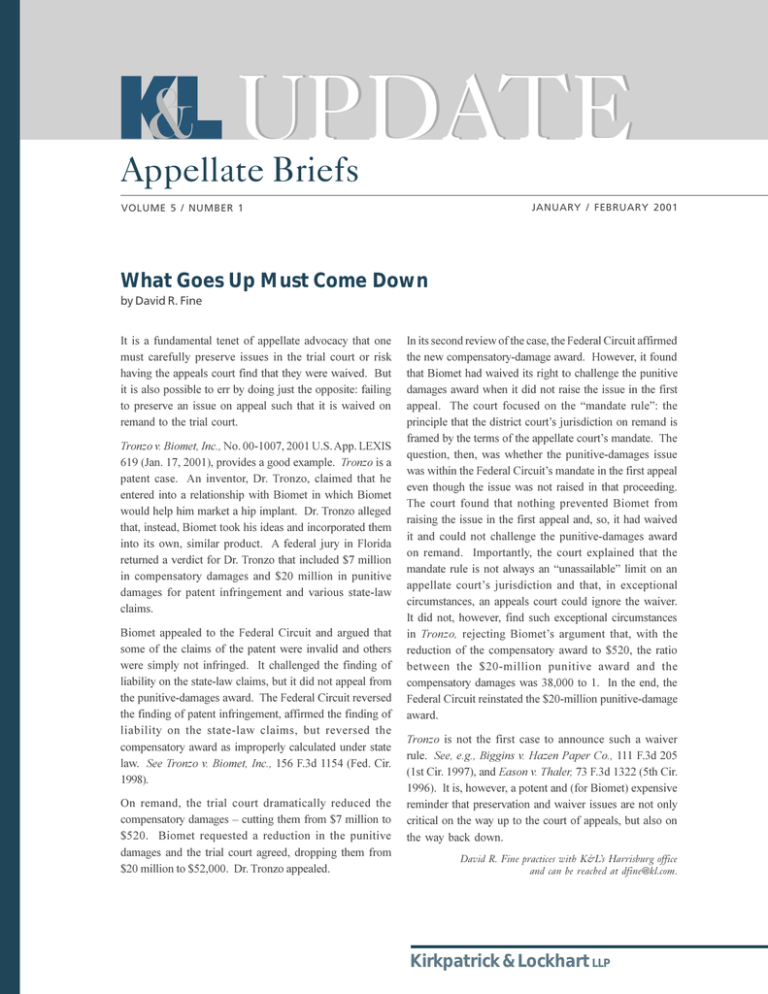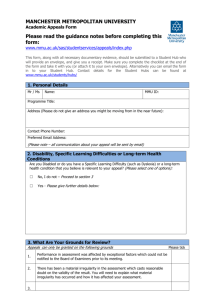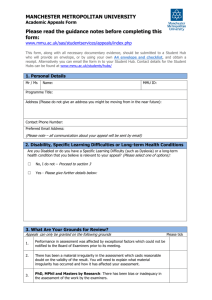UPDATE Appellate Briefs What Goes Up Must Come Down
advertisement

UPDATE Appellate Briefs JANUARY / FEBRUARY 2001 VOLUME 5 / NUMBER 1 What Goes Up Must Come Down by David R. Fine It is a fundamental tenet of appellate advocacy that one must carefully preserve issues in the trial court or risk having the appeals court find that they were waived. But it is also possible to err by doing just the opposite: failing to preserve an issue on appeal such that it is waived on remand to the trial court. Tronzo v. Biomet, Inc., No. 00-1007, 2001 U.S. App. LEXIS 619 (Jan. 17, 2001), provides a good example. Tronzo is a patent case. An inventor, Dr. Tronzo, claimed that he entered into a relationship with Biomet in which Biomet would help him market a hip implant. Dr. Tronzo alleged that, instead, Biomet took his ideas and incorporated them into its own, similar product. A federal jury in Florida returned a verdict for Dr. Tronzo that included $7 million in compensatory damages and $20 million in punitive damages for patent infringement and various state-law claims. Biomet appealed to the Federal Circuit and argued that some of the claims of the patent were invalid and others were simply not infringed. It challenged the finding of liability on the state-law claims, but it did not appeal from the punitive-damages award. The Federal Circuit reversed the finding of patent infringement, affirmed the finding of liability on the state-law claims, but reversed the compensatory award as improperly calculated under state law. See Tronzo v. Biomet, Inc., 156 F.3d 1154 (Fed. Cir. 1998). On remand, the trial court dramatically reduced the compensatory damages cutting them from $7 million to $520. Biomet requested a reduction in the punitive damages and the trial court agreed, dropping them from $20 million to $52,000. Dr. Tronzo appealed. In its second review of the case, the Federal Circuit affirmed the new compensatory-damage award. However, it found that Biomet had waived its right to challenge the punitive damages award when it did not raise the issue in the first appeal. The court focused on the mandate rule: the principle that the district courts jurisdiction on remand is framed by the terms of the appellate courts mandate. The question, then, was whether the punitive-damages issue was within the Federal Circuits mandate in the first appeal even though the issue was not raised in that proceeding. The court found that nothing prevented Biomet from raising the issue in the first appeal and, so, it had waived it and could not challenge the punitive-damages award on remand. Importantly, the court explained that the mandate rule is not always an unassailable limit on an appellate courts jurisdiction and that, in exceptional circumstances, an appeals court could ignore the waiver. It did not, however, find such exceptional circumstances in Tronzo, rejecting Biomets argument that, with the reduction of the compensatory award to $520, the ratio between the $20-million punitive award and the compensatory damages was 38,000 to 1. In the end, the Federal Circuit reinstated the $20-million punitive-damage award. Tronzo is not the first case to announce such a waiver rule. See, e.g., Biggins v. Hazen Paper Co., 111 F.3d 205 (1st Cir. 1997), and Eason v. Thaler, 73 F.3d 1322 (5th Cir. 1996). It is, however, a potent and (for Biomet) expensive reminder that preservation and waiver issues are not only critical on the way up to the court of appeals, but also on the way back down. David R. Fine practices with K&L’s Harrisburg office and can be reached at dfine@kl.com. Kirkpatrick & Lockhart LLP NOTA BENE In CSX Transportation, Inc., v. City of Garden City, 235 F. 1325 (11 Cir. 2000), the circuit court acknowledged the rule that a partial adjudication on the merits, followed by a voluntary dismissal without prejudice of a pending claim, does not effectively terminate the litigation and, therefore, does not satisfy the finality requirement of 28 U.S.C. § 1291. The purpose of the rule is to discourage collusive attempts by parties to manufacture a final order for the purpose of pursuing an appeal. In the case before the court, the defendant prevailed on a motion for summary judgment and then agreed to a voluntary dismissal with the third-party defendant. The plaintiff appealed after entry of the dismissal. Despite the general rule, the circuit concluded that it had appellate jurisdiction because the plaintiff did not participate in the voluntary dismissal, and it appeared that the parties which did participate might have intended to manufacture non-appealability. Under these circumstances, the appeals court recognized finality because, otherwise, an appellant could lose all right to appeal. th ON THE DOCKET The U.S. Court of Appeals for the Third Circuit recently reversed a district courts dismissal of a complaint asserting federal preemption. See NE Hub Partners, L.P. v. CNG Transmission Corp., No. 00-3387 (Jan. 29, 2001). NE Hub filed a complaint in district court seeking to preclude the Pennsylvania Department of Environmental Protection (DEP) and the Pennsylvania Environmental Hearing Board (EHB) from entertaining various technical, safety, and environmental challenges to NE Hubs underground natural gas salt cavern storage project, that were being raised by competitors. NE Hubs preemption claims were based on the ground that the Federal Energy Regulatory Commission (FERC) had already considered those challenges. The district court dismissed NE Hubs complaint, concluding that NE Hubs claims were not yet ripe because the state review process was ongoing and no final decision had been reached by the EHB. The Third Circuit reversed the district court, ruling that NE Hubs preemption claims were ripe despite the lack of a final state decision because the potential for conflict with the federal regulatory scheme and the hardship imposed on NE Hub arose from the state review process itself. The court concluded that the state review process could be preempted either because the federal scheme occupied the field, or because of an actual conflict between federal and state action, or, indeed, because a hybrid form of preemption might apply. Significant to the courts decision was the fact that NE Hub and the DEP had reached a stipulation in which the DEP agreed that its jurisdiction over the technical, safety and environmental challenges had been preempted by FERCs decisionmaking. Walter Bunt and Dan Trocchio of K&Ls Pittsburgh office and Andrew Cline of K&Ls Harrisburg office represented NE Hub in the district court and in the court of appeals. In Westmoreland County v. RTA Group, Inc., No. 392 C.D. 1999 (February 12, 2001), the Commonwealth Court of Pennsylvania affirmed the finding of the Westmoreland County Court of Common Pleas that RTA Group, Inc. (RTA), a real estate consulting service, engaged in champerty and maintenance, as well as the unauthorized practice of law, in connection with its solicitation and representation of property owners in tax assessment appeals before the Westmoreland County Board of Assessment Appeals. In its opinion affirming the grant of summary judgment, the Commonwealth Court found that Westmoreland County had proven the elements of champerty, in which a third party having no legitimate interest in a lawsuit pursues a partys claim at its own expense in consideration of receiving a share of the proceeds of the suit. In addition, the Commonwealth Court held that RTA engaged in the unauthorized practice of law when it exercised legal judgment in completing assessment appeal forms, determining whether to retain an attorney on behalf of property owners and advising property owners concerning the necessity of and method of payment of taxes accrued during the pendency of the appeal. Robert L. Byer and William J. Labovitz of K&Ls Pittsburgh office represented Westmoreland County in the trial court and on appeal. This Update is a bi-monthly publication of the Appellate Practice Group of Kirkpatrick & Lockhart LLP. EDITOR Andrew H. Cline CONTRIBUTING EDITOR David R. Fine For more information, contact us at appeals@kl.com or at any of our offices: BOSTON 75 State Street Boston, Massachusetts 02109 617.261.3100 Rory FitzPatrick, rfitzpatrick@kl.com DALLAS 3100 Bank One Center 1717 Main Street Dallas, Texas 75201 214.939.4900 Frederick Linton Medlin, fmedlin@kl.com HARRISBURG Payne Shoemaker Building 240 North Third Street Harrisburg, Pennsylvania 17101 717.231.4500 Andrew H. Cline, acline@kl.com LOS ANGELES 10100 Santa Monica Boulevard Seventh Floor Los Angeles, California 90067 310.552.5000 Robert E. Feyder, rfeyder@kl.com MIAMI 201 South Biscayne Blvd. Suite 2000 Miami, Florida 33131 305.539.3300 Carlos M. Sires, csires@kl.com NEWARK The Legal Center One Riverfront Plaza, Seventh Floor Newark, New Jersey 07102 973.848.4000 Anthony P. La Rocco, alarocco@kl.com NEW YORK 1251 Avenue of the Americas New York, New York 10020 212.536.3900 David Simon, dsimon@kl.com PITTSBURGH Henry W. Oliver Building 535 Smithfield Street Pittsburgh, Pennsylvania 15222 412.355.6500 Robert L. Byer, rbyer@kl.com SAN FRANCISCO 100 Pine Street, Suite 3200 San Francisco, California 94111 415.249.1000 Edward P. Sangster, esangster@kl.com WASHINGTON 1800 Massachusetts Avenue, N.W. Second Floor Washington, DC 20036 202.778.9000 Dick Thornburgh, rthornburgh@kl.com www.kl.com Kirkpatrick & Lockhart LLP Challenge us. © 2001 KIRKPATRICK & LOCKHART LLP This publication is for informational purposes and does not contain or convey legal advice. The information should not be used or relied upon in regard to any particular facts or circumstances without first consulting with a lawyer.





